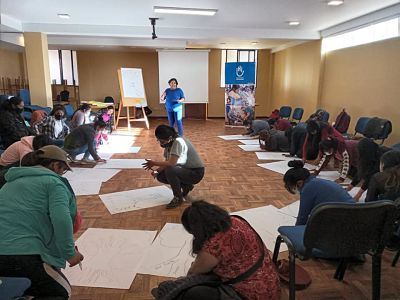Higher Rates of Violence for Women with Disabilities
One in three women experiences physical or sexual violence within their lifetime. Additional factors of vulnerability such as inequality, poverty, crisis, and disability further increase the risk of violence to women and girls worldwide.
Often targeted due to mobility limitations, dependency on others, or barriers to reporting abuse, women and girls with disabilities experience significantly higher rates of violence than those without disabilities. They are also subjected to abuse for longer periods of time, with fewer resources available.
“Violence against women with disabilities is a reality,” says Lidia Pereira, Humanity & Inclusion (HI) Economic Insertion Project Manager in Bolivia. “But it is not always visible. Violence prevention services do not necessarily have knowledge surrounding disability, so access to information and care is limited for them.”
Gender-Based Violence in Bolivia
Bolivia is no exception to this epidemic. The country has the highest number of teenage pregnancies in Latin America, often linked cases of sexual abuse. 52.3% of women report having experienced physical or sexual violence by an intimate partner, but only 1% of all gender-based violence cases are prosecuted and convicted.
In Bolivia, women with disabilities are ten times more vulnerable to sexual violence than women without disabilities. Seven out of ten women with disabilities report having been subjected to violence within their families, and half of those reported being survivors of sexual violence. It is estimated that only a small percentage of cases are reported, given that many women and girls with disabilities are in situations of dependency.
HI: Protecting and Empowering Women
Among its projects in Bolivia, HI addresses the issue with a community-based inclusive approach to prevent violence against women. Alongside the Gregoria Apaza Women’s Promotion Center and the Institute of Socioeconomic Research of the Universidad Catolica San Pablo, HI works to ensure that women with and without disabilities can demand, advocate for, and exercise their rights.
HI tackles factors that magnify vulnerability to violence by:
- Educating women and girls about their sexual and reproductive health. HI has developed and published accessible, inclusive guides and materials for women, girls and caregivers of varying ability.
- Strengthening financial resilience. HI works to improve inclusive access to training and job placement to enable women with disabilities to gain financial independence and autonomy.
- Promoting women’s rights. HI develops material and trainings to raise awareness about women’s right to live free of violence and access comprehensive education.
- Strengthening community resources for violence prevention and care. HI works to include the needs and participation of vulnerable women, including women with disabilities, in response plans. HI identifies and shares accessible gender-based-violence resources.
Training Community Promoters
 Women participate in training sessions as community promoters to gain knowledge and confidence to exercise their rights.
Women participate in training sessions as community promoters to gain knowledge and confidence to exercise their rights.
One participant shared that her role as leader of a local women’s group resulted in her experiencing domestic violence at home. After reporting her case to the authorities, she said that taking part in HI’s sessions has allowed her to feel “safe and content” with her decision to denounce her aggressor.
Lidia Pereira says, “With this proposal developed by HI and its partners, women with and without disabilities can have the tools to prevent, inform and support other women in situations of violence, promoting a life free of violence for all women.”


 Women participate in training sessions as community promoters to gain knowledge and confidence to exercise their rights.
Women participate in training sessions as community promoters to gain knowledge and confidence to exercise their rights.


